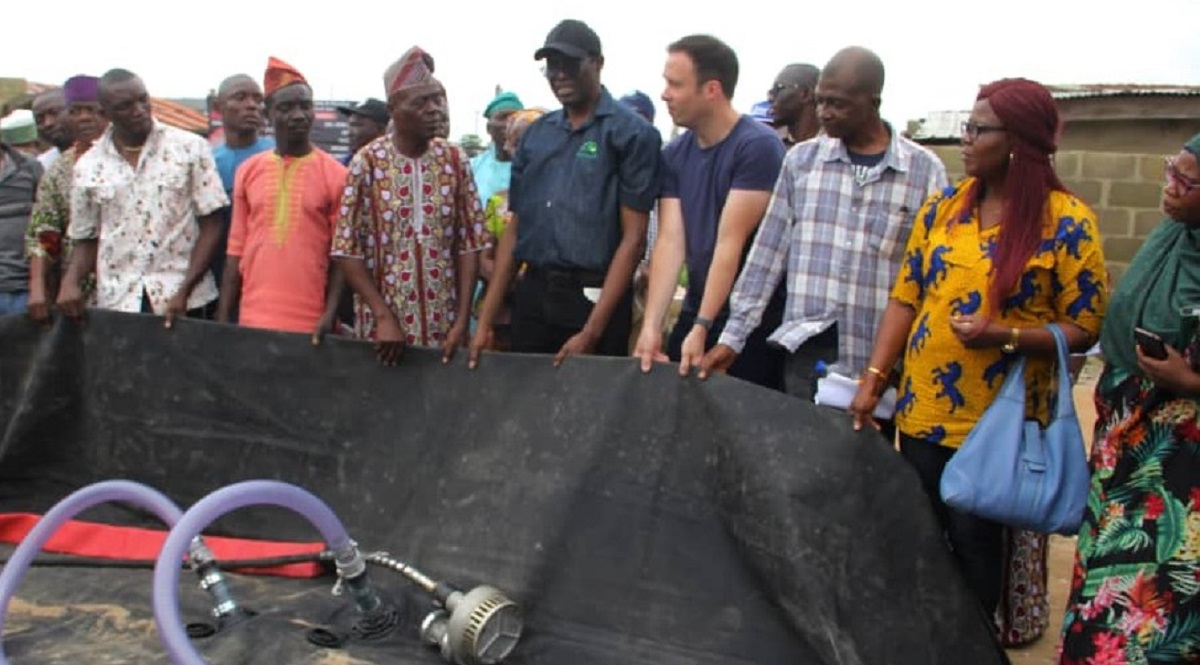Broadcasting
Lagos Community Becomes First in Africa to Implement AfDB’s Innovative Flood Solution

The Lagos State Government has become the first in Africa to implement the innovative SLAMDAM flood management solution at the Omojuwa Estate in Kosofe Local Government Area (LGA) of the state.

SLAMDAM is an easily deployable water-filled flood barrier. This innovative project is implemented as part of the Adaptation Benefit Mechanism (ABM) Program by the African Development Bank Group (AfDB) that aims to implement Innovative Solutions to Mitigate Flood Risks and Strengthen the Resilience to Climate Change-Induced Flooding at Community Level.
The project is designed to implement small-scale high-impact highly replicable climate change adaptation demonstration technique with a focus on the water sector in Nigeria.
The Brinker Consortium made up of Natural Eco Capital (Nigeria), Zephyr Consulting (Netherlands) and Slamdam BV (Netherlands) are the AfDB’s consultants implementing the project.
Speaking at the Omojuwa Estate formal flood-barrier equipment handover ceremony at the community, Engr. Tayo Fagbeku, Director Lagos State Drainage and Planning Services expressed delight at the development. “We decided to be the take on this project because we are not averse to innovative ideas that will be of benefit and contribute to the various solutions we have to manage floods in Lagos. The result of this pilot has been excellent and encouraging.”
Dr. Eugene Itua, MD Natural Eco Capital spoke. “This pilot started with Omojuwa Estate and Iponri communities in Lagos State. While Omojuwa is the first to the complete the process, Iponri will follow soon. The mobile flood barrier (SLAMDAM), and other associated equipments are being given free of charge by the AfDB. One interesting aspect of these whole solution is that water is being used to fight water.”
Omar Saleh, Project Lead Consultant & CEO Zephyr spoke about the project approach and objectives. Project location is selected through; field visits and hydrodynamic modeling software, followed by determining the deployment strategy and locations for the flood barrier and finally designing of the appropriate SLAMDAM-technology for the location. The project also developed and tested the ABM-methodology, which an innovative method to support rapid mobilization of funding to further scale-up climate adaptive measures such as SLAMDAM .
The objectives of the project are; to demonstrate the SLAMDAM-technology, being a mobile flood barrier, as an effective solution to adapt to climate change-induced floods; and to test the ABM-methodology in order to measure the certified benefits from SLAMDAM using a flood intelligence tool.
Charles Otabor, the community leader of Omojuwa Estate says, “We like the community approach of this project. Our Flood Response team as first responders has been trained. Moreover, hands-on demonstration of the technology has also taken place. We pledge to utilize these equipments appropriately for the benefit of our community, and the people of Lagos State.
A day earlier a stakeholder-workshop was held which had representatives from the state ministries of environment, transport, agriculture, Drainage, SDG office, Lagos Resilence office, and other relevant agenicies present.
At the federal level, ministry of environment, institutions and MDAs such as Unilag, NRC, NIMET, FIIRO, etc were present. Majority of which were also present at the Omojuwa handover ceremony.
Natural Eco Capital is a sustainability firm with a unique cutting edge to support organisations (Public and private) drive for more sustainable resilient business and economy.
Zephyr Consulting offers fully integrated climate adaptive solutions with a distinct focus on enhancing resilience against climate-induced flooding and drought.
SLAMDAM is the only manufacturer of a TUV-certified temporary dam in the world and was awarded the most effective solution against floods in 2018 in a Defense competition.
Broadcasting
Pheelz Shares His Journey on Glo-Sponsored African Voices

Nigerian singer, songwriter and producer Pheelz (Phillips Kayode Moses) is set to feature this weekend on African Voices Changemakers, the flagship magazine programme on CNN International.

The 30-minute episode, sponsored by digital solutions company Globacom, premieres on Saturday, February 21, 2026. In a candid sit-down with host Larry Madowo, Pheelz opens up about his journey from church musician to global hitmaker, reflecting on the intersections of faith, fame and the expanding influence of Afrobeats on the world stage.
Now 31, Pheelz began his musical path as a multi-instrumentalist in church before earning widespread acclaim in 2012 as the producer behind the hit tracks “First of All” and “Fucking with the Devil” on Olamide’s YBNL album. His rapid rise saw him named among NotJustOk’s Top 10 Hottest Producers in Nigeria in 2013.
He further solidified his reputation by producing nearly every track on Olamide’s Baddest Guy Ever Liveth, earning nominations at The Headies 2013 and in the Producer of the Year category at both The Headies 2014 and the Nigeria Entertainment Awards. In 2020, he clinched The Headies Producer of the Year award, and in 2021 secured the Soundcity MVP Award for Best Collaboration for “Finesse,” his smash hit with Bnxn (formerly Buju).
On the programme, Pheelz reflects on the experiences that shaped his sound and creative philosophy, discusses landmark collaborations, shares his perspective on artificial intelligence and artistry, and explains why sound, storytelling and culture remain central to African music’s global resonance.
The show airs on DSTV Channel 401 at 8:30 a.m. (WAT) on Saturday, with repeat broadcasts at 12:00 noon the same day; Sunday at 4:30 a.m. and 7:00 p.m.; Monday at 4:00 a.m. and 6:45 p.m.; and Tuesday at 6:45 p.m. The broadcast schedule continues through Monday of the following week.
Broadcasting
Dr. Cairo Ojougboh Foundation Bolsters Nigeria’s Education Drive with ₦2.7m Student Support

Dr. Cairo Ojougboh Foundation has reinforced government’s educational development efforts in Nigeria through a targeted initiative honouring the late medical doctor and House of Representatives member, Dr. Cairo Ojougboh.

L-R: Son of the late Dr, Cairo Ojougboh, Mr. Nkem Ojougboh; Chairperson, Dr. Cairo Ojougboh Foundation, Mrs. Bose Ojougboh and another son, Mr. Orieka Ojougboh, during the event in Agbor, Delta State recently.
The foundation recently hosted a programme themed “Your Future, Your Choice” at St. Columba’s Grammar School in Agbor, headquarters of Ika South Local Government Area, Delta State.
It presented a cheque of ₦2,700,000 to cover examination fees for students preparing for West African Examinations Council (WAEC), National Examinations Council (NECO), and Junior Secondary School (JSS) 3 exams.
Academic excellence received further boosts with cash rewards for top students across the school’s nine academic arms, alongside distributions of notebooks and writing materials to enhance learning.
Chairperson Mrs. Bose Ojougboh, joined by her sons Mr. Nkem and Mr. Orieka Ojougboh, urged students to view challenges as stepping stones, embrace discipline, consistency, and focus, and make intentional choices shaping their futures.
“The school that moulded Dr. Cairo’s values deserves our support,” she said, highlighting the foundation’s commitment to inspiring hard work and personal growth.
Old Boys of St. Columba’s Grammar School, led by Elder Ndudi Agholor, attended in force, sharing nostalgic reflections and praising the school’s sustained high standards under current leadership.
School Principal Rev. Fr. Joseph Ugboh and Ika South LGA Chairman Engr. Jerry Ehiwarior lauded the initiative as “commendable and impactful,” calling for its continuation to preserve Dr. Ojougboh’s legacy of discipline, excellence, and service.
They noted the support had motivated students to pursue their goals with renewed determination, ending the event on a hopeful note.
Broadcasting
New Horizons Nigeria Breaks Ground: First to Fuse Mandarin into ICT Curriculum

In a landmark educational innovation, New Horizons Nigeria has become the first institution to integrate the Chinese (Mandarin) language into its ICT curricular as an elective, thereby positioning Nigerian students for relevance in the rapidly changing world order.

Mr. Tim Akano, Managing Director and CEO of New Horizons Systems Solutions Limited
New Horizons Nigeria is a leading ICT training and solutions provider committed to provide individuals and institutions with future-ready skills. Through innovative program, global partnerships, and strategic foresight, the organization continues to redefine education, workforce development, and global competitiveness.
With over 80% of global consumer products manufactured in China and China’s growing dominance in global supply chains and labour markets, New Horizons Nigeria recognizes the urgent need for the current generation to understand, speak, and engage with the Chinese language and culture. As global economic power dynamics evolve, the labour market is increasingly tilting towards China, making Mandarin proficiency a critical competitive advantage.
According to Mr. Tim Akano, Managing Director and CEO of New Horizons Systems Solutions Limited, Nigeria, the program represents far more than a language course.
He asserted that very soon, the global labour market is likely to increasingly reflect China’s influence rather than the predominantly western orientation it currently exhibits. Language will be a major differentiator and the first Chinese-speaking technology experts in Nigeria will have a significant advantage, especially in integration into Chinese companies operating locally and globally.
Therefore, New Horizons Nigeria has officially launched a Mandarin Scholarship Program with China Advancement Opportunity, selecting 100 outstanding students from five prominent Nigerian secondary schools. This initiative marks a major milestone in Nigeria–China educational cooperation and reflects a forward-thinking response to shifting global economic realities.
Furthermore, the scholarship program has commenced with an intensive three-month online Mandarin training and at the end of the program, the top-performing students will be selected strictly on merit. 20 outstanding students will receive an additional scholarship valued at $2,500 per students to participate in a one-year pre-degree Mandarin and cultural immersion program in China. From this group, the best candidates will progress to fully funded admission scholarships into top universities in China. This initiative is designed not only to build language proficiency but also to enhance global competence, international exposure, and cultural intelligence among Nigerian students.
Also, to maintain international academic standards, participating schools are required to comply with strict guidelines. They will be obligated to join the online classes ten minutes earlier, they must have a minimum of 85% attendance throughout the program, and must ensure they have a stable internet connectivity, reliable power supply and a conducive learning environment.
Therefore, School owners and administrators have been formally congratulated and strongly encouraged to nominate their most disciplined, and committed students, as advancement to the China program will be strictly merit-based.
However, apart from students, internation business men are equally encouraged to attend New Horizon’s Mandarin executive lessons which will equip them with basic Chinese language to enhance their business communications.
Additionally, while the pilot phase begins with selected secondary schools which includes Startrite School, Lightway School, British Nigerian Academy School, Honeyland Schools and Great Heights School, the Mandarin program will be available as an elective ICT course at all New Horizons retail centers.
This is done to extend access to students and learners beyond its partner schools and within one year, committed learners will be able to communicate effectively in Mandarin, which will open doors to global employment, trade, and cultural exchange.
In conclusion, a Mandarin Cultural Fiesta will be hosted, bringing together educators, students, institutional partners, and distinguished guests from China and Nigeria. The event will celebrate outstanding performance, cross-cultural exchange, and the strengthening of bilateral educational ties.
For enquiries and participation details, interested individuals are encouraged to contact New Horizons Nigeria via 08125541750

 E-Financial2 days ago
E-Financial2 days agoEcobank Nigeria Fully Repays $300m Eurobond Notes

 E-Financial2 days ago
E-Financial2 days agoZenith Bank Warns Public Over Fake Jim Ovia Investment Videos

 General News1 day ago
General News1 day agoPalmPay Unveils First Batch of Winners in #LoveWithPalmPay Campaign

 E-Business2 days ago
E-Business2 days agoChams Carves Out Subsidiary to Support Africa’s Digital Transformation

 E-Financial2 days ago
E-Financial2 days agoBoI Secures CBN’s Approval for Non-interest Banking Operation

 E-Financial1 day ago
E-Financial1 day agoFirstCap MD says Payment Security Remains Biggest Barrier to Bankable Gas and Power Projects

 E-Business2 days ago
E-Business2 days agoNigeria, South Africa Drive Stablecoin Spending in Africa

 Telecom2 days ago
Telecom2 days agoAfrica’s Active Data Centres’ Capacity on Back Foot, Despite Investment Push
























